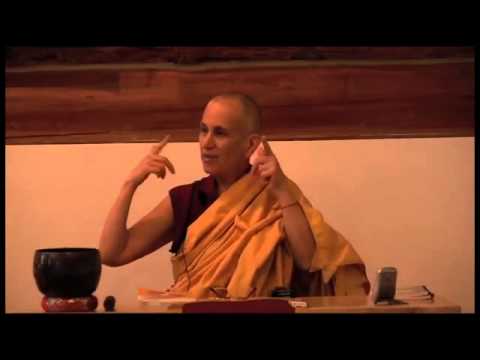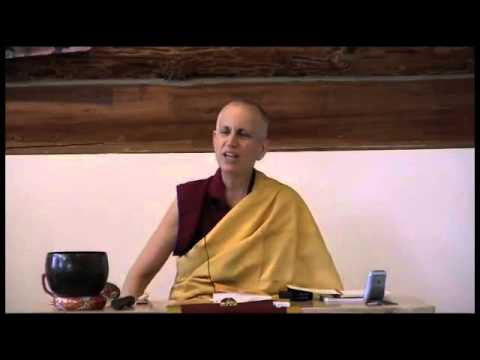Power of resolve: Becoming Vajrasattva
Part of a series of teachings given at the Winter Retreat from December 2011 to March 2012 at Sravasti Abbey.
- Overview of the four opponent powers in the Vajrasattva practice
- Seeing Vajrasattva as the projection of our own mind
Vajrasattva 30: Power of determination, part 3 (download)
We have been speaking on the “Power of Determination,” the Vajrasattva practice, and I wanted to do just a quick summary before we proceed. So we’ve gotten some clarity and some understanding from doing this practice.
First of all, we’re getting a little bit clearer about the cause of our suffering. That our mind, under the control of ignorance and affliction, is the propelling cause for why we create all of these destructive actions and why we need to purify. So we’ve gotten a little bit clearer on that.
And we’ve also gotten clearer that if we want to create the causes for happiness for this life and for future lives, including our own awakening for the benefit of others, we have to reconfirm our refuge; to look towards Vajrasattva who’s the embodiment of the Three Jewels as that safe direction in order to create the causes for happiness. So we’ve gotten a little bit more wisdom and understanding about that.
And then through the power of regret, we are really getting some clarity and wisdom on the power of karma; by seeing the suffering that we caused ourselves and others in the past, to understanding that unless we purify we are going to definitely experience the suffering results in the future. We have set a course to determine that we are going to do our best as honestly and as consistently as possible to start changing the destructive actions of body and speech that tend to be the causes for that future suffering. So we’ve made this very strong determination, our practice to Vajrasattva, to do our best to refrain from these. And they depend on the severity of the karma and how strong the propensity is, and we do our best to make a realistic promise to him. So that’s where we’ve gone so far.
A projection of our own mind
So now we are at the paragraph:
Vajrasattva is extremely pleased and says my spiritual child of the essence all your negativities, obscurations and degenerated vows have now been completely purified.
This paragraph needs a little bit of interpreting. I’ll share my experience with you about it. One of the problems that I ran into, and I’m still running into somewhat, is that coming into Buddhism from a Judeo-Christian religious background, I brought a lot of past beliefs about who I thought was actually in control and in charge of my life. And that bringing it into the Dharma, I have this continual process of understanding that it isn’t somebody out there or up there who has the final say on what happens to me. But I can see that I have that propensity because of all the years of another religious tradition that I bring that in. So when I came to this paragraph, I had a lot of resistance because I was getting the idea that Vajrasattva was sort of playing this being that was doing all of this, “Ok, I’m going to remove your negativities. I’m going to purify all your karmic imprints and all your degenerated vows. And I’m the one that’s doing it.”
So I was putting Vajrasattva in the place of some sort of external being that had the power to do all of this; sort of like a savior in celestial silks. Rather than Jesus or God, I was putting him as either a Buddha in monastic robes, a savior, or a savior in celestial silks. And it wasn’t empowering the practice and it was getting me really, really confused. So when Venerable taught on this practice last year in Vajrapani, she interpreted this and asked us to look at it in this way (and I have found this so helpful and empowering), she says that Vajrasattva is a projection from our own mind. In fact the entire practice is a projection from our own mind and that he represents our own future Buddha that we are going to become. He is not saint Vajrasattva who was canonized by His Holiness the Dalai Lama. He is a manifestation of our own compassion and wisdom in fully developed form, and the one on top of our head is a projection of our mind of the good qualities that we already have. And that he is a projection of our mind’s innate purity that we are trying to get in touch with. So this is the way that Venerable is really encouraging us to look at Vajrasattva in the practice.
And because he is this projection of the manifestations of our good qualities, he is not going to lay any trips on us. In fact he is encouraging us to place ourselves in our best possible light; to really see ourselves with this wisdom growing, this compassion, this willingness to purify, our Bodhicitta growing. So she says, the way to add some power and some benefit to this is, that just as in many parts of our lives where we see something that we’re very clear about a decision that we have to make, our wisdom mind has decided we have to make a choice. And she says, you know those times when you have to make those really tough, wise decisions (and in this practice we have been confessing, we’ve been purifying, we’ve made a strong resolve to change a lot of our destructive behaviors). She says it’s really great to have Vajrasattva as our own wisdom mind saying, “You know this is really great what you’re doing.” Just like in our regular life when we have these hard good choices to make, and we have a really good friend that says, “Go for it you’re really on the right track.” And so we see him as our wisdom mind supporting us in all aspects of our virtuous activity.
And so then when we get to the point (the next paragraph) where it says:
With delight Vajrasattva melts into light and dissolves into you. Your body, speech and mind become inseparably one with Vajrasattva’s holy body, speech and mind. Concentrate on this.
So here she says, “Well, okay, you’ve got this projection from your mind on the top of your head, of all of your good qualities and your buddha potential, but then he just doesn’t walk away and say, ‘See you later.'” So you imagine that he is delighted, that he melts into light, and unites into your own good heart. And that he comes back into our minds, the very mind that projected that buddha potential on the crown of our heads, and now becomes inseparable with our own body, speech and mind. So after a while, hopefully, Vajrasattva is in our own good heart and it’s a little bit hard to tell the difference between them; that they are actually that close together.
And so that’s how she encourages us to see him. And to not see him as some sort of external being that has the power to forgive or to save us, or that’s someone that we have to please or appease in any way. But that this is a skillful means to work on our own mind; to grow our own good qualities, our own confidence in the power of the practice and in the strength and determination of our minds, as well as our own potential to become awaken for the benefit of all sentient beings. So it’s basically saying, “Be the Vajrasattva that we all want to become.”
Venerable Thubten Semkye
Ven. Semkye was the Abbey's first lay resident, coming to help Venerable Chodron with the gardens and land management in the spring of 2004. She became the Abbey's third nun in 2007 and received bhikshuni ordination in Taiwan in 2010. She met Venerable Chodron at the Dharma Friendship Foundation in Seattle in 1996. She took refuge in 1999. When the land was acquired for the Abbey in 2003, Ven. Semye coordinated volunteers for the initial move-in and early remodeling. A founder of Friends of Sravasti Abbey, she accepted the position of chairperson to provide the Four Requisites for the monastic community. Realizing that was a difficult task to do from 350 miles away, she moved to the Abbey in spring of 2004. Although she didn't originally see ordination in her future, after the 2006 Chenrezig retreat when she spent half of her meditation time reflecting on death and impermanence, Ven. Semkye realized that ordaining would be the wisest, most compassionate use of her life. View pictures of her ordination. Ven. Semkye draws on her extensive experience in landscaping and horticulture to manage the Abbey's forests and gardens. She oversees "Offering Volunteer Service Weekends" during which volunteers help with construction, gardening, and forest stewardship.


